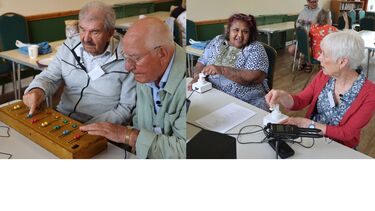Music for Dementia and the Muses, Mind, Machine (MMM) research centre at the University of Sheffield last week co-hosted an industry roundtable bringing together technology manufacturers, accessibility experts, record labels, radio professionals and dementia sector leaders to tackle critical barriers preventing older adults and people living with dementia from accessing music.
The Music Made Easy Roundtable, held at children’s audio platform Yoto’s HQ in London, represents the first in a series of industry events run by Music for Dementia to support its Music Made Easy campaign, launched in September 2025 to challenge accessibility gaps across the music and technology sector.
The event convened more than 19 senior representatives including Universal Music Group, BPI, BBC, Music for Dementia partner Yoto and leading independent advocates – alongside research experts from the University of Sheffield’s BRIDGES for Dementia Network, which focuses on designing and applying technology to empower people with dementia.
Discussions centred on device accessibility, platform design, the need to co-design alongside lived experience advisors, and the commercial and cultural case for prioritising older audiences. The University of Sheffield contributed research-led insight into participatory and inclusive design approaches, informed by work taking place across the MMM research centre.
Participants explored critical questions: How can we ensure people living with dementia are integrated into the design process from day one? How can we change licensing restrictions to support easier access to music? How can we better communicate existing tools and support? And how can cross-sector partnerships help to accelerate progress?
The roundtable discussion revealed that there are pockets of real progress being made by individual organisations and sectors, but that meaningful and lasting change will require coordinated, industry-wide collaboration. To this end, Music for Dementia, with the support of Muses Mind Machine, will be spearheading a new taskforce to improve music accessibility for people living with dementia.
Karim Fanous, Director, Innovation and New Digital Business, Global Digital Strategy at Universal Music Group said:
“Music for wellness and health is a vital area in our search for startups and support of entrepreneurial innovation that might add value to music and society. Music for Dementia and the University of Sheffield are initiating an important multi-stakeholder project which we will be honoured to support alongside UMG Health and Wellness.”
Emily Ingram, General Manager, Sollos, UMG Health and Wellness said:
“Music can be an enjoyable and effective way to improve lives, whether it’s for people living with dementia or struggling with everyday stress and low mood. Accessibility matters… Through Sollos and our health and wellness partners, we are starting to see what is possible when music, science and technology come together. Music for Dementia is driving vital progress and we are proud to support it.”
Aleksandra Gojkovic, Senior Design Researcher, User Experience and Design at BBC said:
“A big thank you to Music for Dementia and all contributors for sharing their insights, research and work and for facilitating an open and productive conversation about such an important issue of making music more accessible…”
Hailey Willington, BPI Head of Diversity, Equity and Inclusion, said:
“Music for Dementia's roundtable brought together the music ecosystem… by working together, we can redefine what accessible music technology looks like and ensure that it can serve everyone.”
Howard Gordon, Chair of Meeting Centres England, Co-Chair of Deepness Dementia Media Ltd, and advisor from the University of Sheffield’s BRIDGES for Dementia Network, said:
“In the words of Ronald Coleman, ‘true co-production starts with a plain piece of paper.’ People living with dementia should drive co-production of new product designs from the start…”
Recent Music for Dementia research with 1,000 family carers of people living with dementia reveals the scale of the problem: only three in ten older family carers are able to stream music with their loved one. Age UK research paints a similar picture, finding that six in ten internet users aged 65 or over never use the internet to stream music or videos.
Amy Shackleton, Programme Lead at Music for Dementia, said:
“This important roundtable challenged attendees with a fundamental question: what is needed to make music more accessible for older people, especially those living with dementia? The answer is clear – we need cross-sector collaboration, better design practices and a commitment to co-production with users and carers.”
She added:
“There was real energy and passion from attendees to improve access to music for older people. We went in wanting a commitment from people to join a new taskforce, and we are really pleased that so many want to be part of this journey.”
The roundtable also included findings from Music for Dementia’s Yoto Player trial, which adapted the popular children’s audio device for people living with dementia. It found that 92% of participating families would recommend screen-free music devices for older people.
Dr Jennifer MacRitchie, University of Sheffield researcher and member of the MMM research centre, presented co-designed devices and research findings from the Music, Dementia, Technology project. This work involved people living with dementia in developing new tools for playback of familiar music, creating original music, and improvising alongside a musical partner – highlighting both the creative and therapeutic potential of inclusive music technologies.
In the UK, around 940,000 people are currently living with dementia – a figure expected to rise to 1.5 million by 2040. Research shows that music can help to alleviate agitation and distress, support identity and self-expression, stimulate memory, foster connection and reduce isolation.

